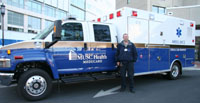Meducare balloon pump therapy rolling
by Cindy
AbolePublic Relations
Cardiac patients from throughout South Carolina can rely upon a new, unique emergency critical care service available through MUSC that enables specialized care for cardiac patients during transport.
 Meducare paramedic
Marshall Kearney stands in front of Medic 1, Meducare’s new critical
care ambulance, which is designed to accommodate intra-aortic balloon
pump patients.
Meducare paramedic
Marshall Kearney stands in front of Medic 1, Meducare’s new critical
care ambulance, which is designed to accommodate intra-aortic balloon
pump patients. MUSC and Meducare began last year providing intra-aortic balloon pump services for adult patient transports using trained critical care paramedics. Meducare is the only ground transport system in the state approved to transport these patients utilizing critical care paramedics.
Balloon-pump therapy, available for both adult and pediatric patients, assists an individual weakened by a heart condition or diagnosed with a com-promised heart function. For these patients, the heart does not have enough energy to adequately pump blood throughout the body. In the procedure, a tiny balloon device is inserted into the heart via a catheter, which assists the heart in pumping. Trained critical care paramedics monitor the patient and their cardiac output to adjust for medications and other services.
This service adds to an array of specialty services already provided by Meducare Ground Transport with MUSC since its establishment in 1997. So far, more than 10 individuals, many of them cardiac patients, have been successfully transported using balloon-pump therapy.
The proposal to add this service was approved as a pilot program by South Carolina Department of Health and Environmental Control’s (DHEC) Emergency Medical Services Division last January. Usually these services require the coordinated effort of a critical care team consisting of a perfusionist, critical care nurse or physician. Now these services can be provided by any of MUSC’s team of critical care paramedics.
MUSC’s nine critical care paramedics are required to complete an extraordinary amount of training working throughout various intensive care units at MUSC. Each critical care paramedic must complete a comprehensive three-week critical care instruction program that features didactic and hands-on training in invasive procedures, including balloon-pump therapy. MUSC paramedics also are required to complete an additional 180 hours of clinical time annually working within the hospital—that’s six additional weeks of required training before new paramedics can begin to work.
“The role of paramedics has vastly changed and evolved for the past 20 years, and since critical care and emergency medicine was established at MUSC,” said John Kratz, M.D., professor of Surgery and balloon-pump transport medical coordinator. “Trained critical-care paramedics can provide proper expertise for patients requiring these specialized services during transport. Working with MUSC’s new Chest Pain Center located in Ashley River Tower, teams will provide quick coordinated care that’s needed to respond to any acute coronary event.”
To complement this specialized service, Meducare expanded its fleet of nine ambulances to include a new critical care ambulance in November. This specialized ambulance is considered the very latest and best in comfort and technology. Much larger in size than a typical ambulance, it is specially equipped to handle balloon-pump therapy patients and is supportive of other specialized services. Most importantly, the new ambulance is designed for long-distance critical-care transports around the state and beyond.
Beginning in February, the new ambulance will be specifically dedicated for use with the Heart & Vascular Center and Chest Pain Center now located at Ashley River Tower.
Friday, Jan. 18, 2008
Catalyst Online is published weekly,
updated
as needed and improved from time to time by the MUSC Office of Public
Relations
for the faculty, employees and students of the Medical University of
South
Carolina. Catalyst Online editor, Kim Draughn, can be reached at
792-4107
or by email, catalyst@musc.edu. Editorial copy can be submitted to
Catalyst
Online and to The Catalyst in print by fax, 792-6723, or by email to
catalyst@musc.edu. To place an ad in The Catalyst hardcopy, call Island
Publications at 849-1778, ext. 201.